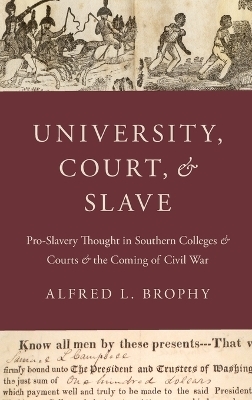
University, Court, and Slave
Oxford University Press Inc (Verlag)
978-0-19-996423-9 (ISBN)
Alfred L. Brophy's University, Court, and Slave reveals long-forgotten connections between pre-Civil War southern universities and slavery. Universities and their faculty owned people -- sometimes dozens of people -- and profited from their labor while many were physically abused on their campuses. Education was often paid for through the profits of enslaved labor. University faculty -- and students -- also promoted the institution of slavery. They wrote about the history of slavery, its central role in the southern economy, and developed a political theory that justified keeping some people in slavery. The university faculty spoke a common language of economic utility, history, and philosophy with those who made the laws for the southern states. That extensive writing promoting slavery helps us understand how southern politicians and judges thought about slavery.
As antislavery rhetoric gained momentum, southern academics and their allies in the courts became bolder in their claims. Some went so far as to say that slavery was supported by natural law. The combination of economic reasoning and historical precedent helped shape a southern, proslavery jurisprudence. Following Lincoln's November 1860 election southern academics joined politicians, judges, lawyers, and other leaders to argue that their economy and society was threatened. Southern jurisprudence led them to believe that any threats to slavery and property justified secession. In some cases, academics took their case to the southern public and, in one case, to the battlefield, to defend slavery.
Alfred L. Brophy is Professor of Law at University of North Carolina at Chapel Hill and the author of Reparations Pro and Con and Reconstructing the Dreamland.
Preface
Introduction
Part I: The Contours of Academic Proslavery Thought
1. The Rebel and the Professor: Nat Turner and Thomas Dew
2. Proslavery Academic Thought in the 1840s and 1850s
3. The Southern Scholar: College Literary Addresses
4. Brown University's President Confronts Slavery
5. The Chancellor, the Slave, and the Student
Part II: Connecting Moral Philosophy and Legal Thought
6. The Fugitive Slave Act of 1850: The Grammar of Proslavery Thought
7. The Novelist and the Jurist: Harriet Beecher Stowe's Jurisprudence of Sentiment
Part III: The Core of Southern Legal Thought
8. Beyond State v. Mann: Thomas Ruffin's Jurisprudence
9. Joseph Henry Lumpkin: Industrialism and Slavery in the Old South
10. Proslavery Jurisprudence: Thomas Reade Roots Cobb's An Inquiry Into the Law of Negro Slavery
11. "The dictate of a wise policy": Precedent, Utility, Progress, Humanity, and the Empirical in Antebellum Jurisprudence
12. Slavery, Property, and Constitutionalism in the Secession Debates
| Erscheinungsdatum | 26.05.2016 |
|---|---|
| Verlagsort | New York |
| Sprache | englisch |
| Maße | 239 x 165 mm |
| Gewicht | 635 g |
| Themenwelt | Geschichte ► Allgemeine Geschichte ► Neuzeit (bis 1918) |
| Geisteswissenschaften ► Geschichte ► Regional- / Ländergeschichte | |
| ISBN-10 | 0-19-996423-8 / 0199964238 |
| ISBN-13 | 978-0-19-996423-9 / 9780199964239 |
| Zustand | Neuware |
| Haben Sie eine Frage zum Produkt? |
aus dem Bereich


